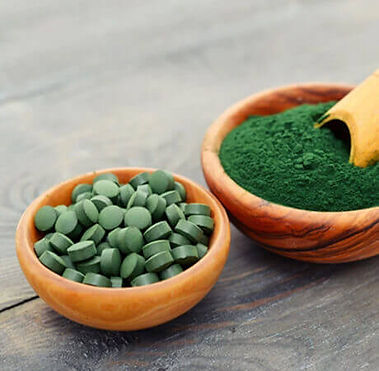Children Love Spirulina & It is Highly Nutritious for Them
Of all the humans that can benefit from taking Spirulina, children can benefit the most.
Miracle food – Spirulina for Children
Children love Spirulina & it is highly Nutritious for them.
Children of all ages can eat Spirulina in complete safety and assimilate its nutrients without difficulty. Even malnourished children with diminished capacity for nutrient absorption could assimilate Spirulina and recover from malnutrition. Spirulina builds up tissue growth, improve vision, strengthens body’s immune system thereby improves resistance to chronic infections, ability to heal and ability to concentrate on children.

JUST FOR A QUICK REFERENCE, HERE ARE SOME OF ESSENTIAL NUTRITIONAL BENEFITS OF SPIRULINA FOR CHILDREN:
-
Chlorophyll is only one molecule different from hemoglobin in human blood, which helps to detoxify our bodies.
-
Beta carotene is pure vitamin A. This antioxidant aids vision in dim light.
-
Gamma-linolenic acid (GLA) is an Omega-6 essential fatty acid. It is believed to have anti-inflammatory properties and may help to relieve pain.
-
Iron helps carry oxygen throughout the body and is essential for healthy blood cells and also known to keep muscle healthy.
-
Zinc helps produce new cells and enzymes and promotes the healing of wounds.
-
Potassium helps maintain a healthy heart and lowers blood pressure.
-
Magnesium helps turn the food we eat into energy, lowers blood pressure, keeps bones healthy and helps prevent osteoporosis.
-
Calcium Essential for strong bones and teeth regulates muscle contraction.
-
Vitamin E helps to maintain healthy skin and protects cell membranes.
-
Vitamin C is also known as ascorbic acid, this is one of the most essential elements of any diet, and is particularly beneficial to the immune system, in helping to prevent colds and flu.


EXCEPTIONAL SOURCE OF NUTRITION FOR YOUR CHILDREN:
Not only is Spirulina a great source of protein and many of the other essential building blocks of whole nutrition in a sound diet, but it also comes without the ecological compromises of many other protein sources. When Spirulina is harvested, packaged, and distributed ethically, it has almost no negative impact on our fragile ecosystem. Unlike animal-based sources of protein, the production of Spirulina does not produce harmful greenhouse gases, deplete our world’s dwindling freshwater supply, or contaminate the water table. With all that in mind, Spirulina is basically a guilt-free nutrition and one that’s good for both you and your children. It is very important for children to begin healthy eating habits at a young age because rich nutrition is not only necessary for their bodies to grow, but it can also influence the way they eat throughout their life. Spiro V's Spirulina is an excellent source of rich nutrition that is safe for children and can easily be included in their diet.
IS IT SAFE FOR CHILDREN?
Spirulina like many other plant-based superfoods is absolutely safe for kids to eat. As a food, Spirulina represents a complete vegetarian protein source. When it is sourced safely and administered correctly, it can be a fantastic supplement for adults and children. The keys to safely giving your kids Spirulina is to know that you are getting it from a safe, reputable source, and to know how much to give them. This is why it is especially important that you only purchase your Spirulina, for yourself and for your children, from a reputable, trusted source, like Spiro V. We only use the purest water and the safest, most ethical harvesting methods.


SPIRULINA FOR CHILDREN – INDIAN STUDIES:
In India, large scale studies with preschool children showed carotenes in Spirulina helped children recover from symptoms of Vitamin A deficiency.
MALNOURISHMENT:
The study among 20 malnourished children in the age group of six years, supplementation of Spirulina at 1g/day for three months showed that there was an increase in serum hemoglobin level and serum protein (1). Change in the academic performance and intelligence level of the children was also seen in the Spirulina supplemented group. A follow-up study among 146 malnourished children for a period of one year indicated that apart from the increase in serum protein and serum albumin level, most of the clinical symptoms like pale conjunctiva showing a higher incidence of anemia, and symptoms like fever, cough, eye and skin infection were reduced after the Spirulina supplementation.


IMPROVEMENT OF VITAMIN – A STATUS:
Spirulina feeding among 5000 rural pre-school children with 1g/day reduced the prevalence of Bitot’s spot and prevented the occurrence of severe form of Vitamin A deficiency — Corneal xerosis. Spirulina supplementation increased the serum retinol levels and reduced the prevalence of B complex deficiency in the preschool children. In another study among preschool children of 3–5 years of age, supplementation of Spirulina at 2g/day for a period of 30 days revealed that the bioavailability of carotenes from Spirulina was comparable to other plant sources. Increase in serum beta carotene level from deficient level to a range close to normal individual level was seen in a study among 30 pre-school children with the supplementation of Spirulina at 2g/day for a period of 30days.

